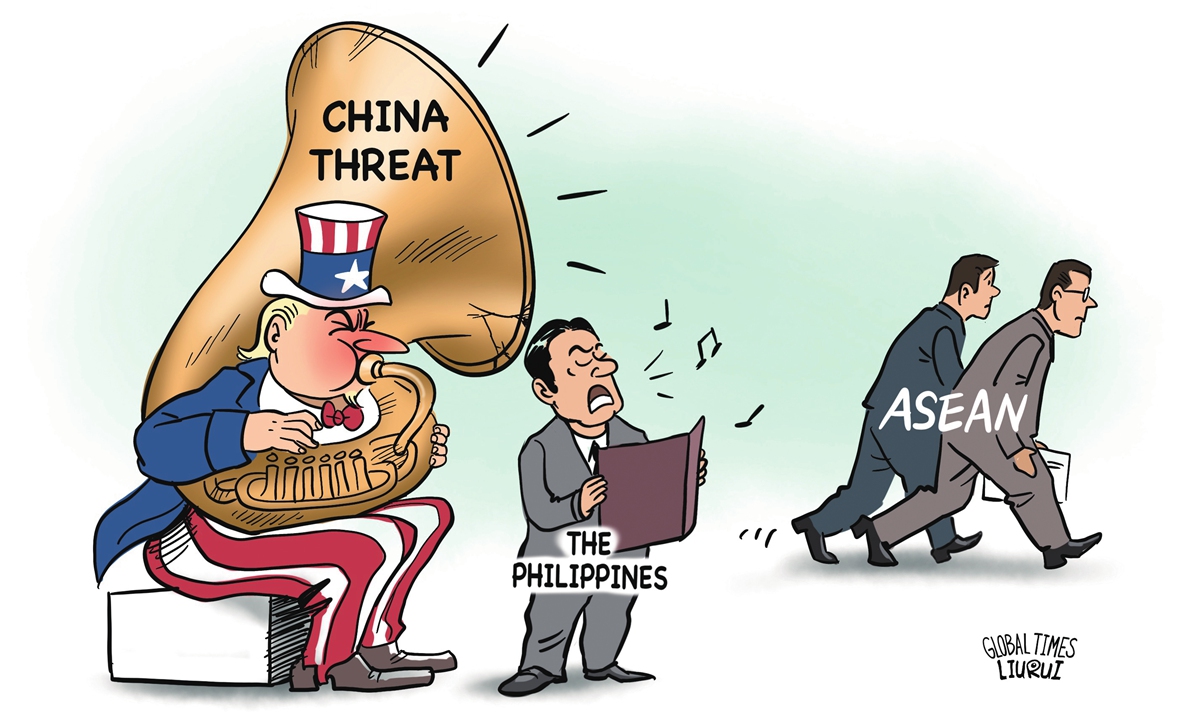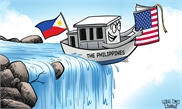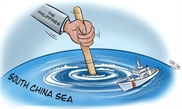ASEAN supports solving problems through diplomatic corridor

Illustration: Liu Rui/GT
Editor's Note:The escalation of recent tensions between China and the Philippines raises concerns among neighboring countries in the South China Sea. How will the Philippines' provocations, instigated and supported by the US, affect the situation in the South China Sea in the rest of 2024? Why does ASEAN hope that the situation will be contained?
In the "ASEAN Perspective on the South China Sea" series, we collect wisdom and insights from former diplomats and scholars from ASEAN member countries. In an interview with Global Times (GT) reporter Ma Ruiqian, Muhammad Syaroni Rofii (Rofii), a lecturer from the School of Strategic and Global Studies at the University of Indonesia, stated that ASEAN does not want the South China Sea to become a battleground for rivalry or military clashes between major powers.
GT: Indonesian President Prabowo Subianto paid a state visit to China from Friday to Sunday. How do you view the significance of China-Indonesia relations? What are your expectations for the future of bilateral relations under Prabowo's leadership?
Rofii: President Prabowo is a man with a strategic mission. He has a military background and a strong understanding of geopolitics and gained significant experience during his time as Indonesia's minister of defense, where he met with many world leaders. When he was president-elect, he visited several countries, including China, where President Xi Jinping and he met. This sends a signal that Indonesia maintains a strong relationship with China.
Prabowo also recognizes the significant Chinese investment in Indonesia, particularly in infrastructure projects like the high-speed rail. In the future, he will view China as a strategic partner. Indonesia calls for a free and active foreign policy, meaning the country will not become a part of either the Eastern or Western bloc, but will position itself in the middle.
GT: Recently, the South China Sea has become less peaceful, with the US and the Philippines joining forces to escalate tensions. Do you think the Philippines is acting against the interests of ASEAN countries?
Rofii: At the moment, one of the major concerns for leaders in the region is the South China Sea. The Philippines is one of the countries involved in tensions with China over territorial disputes, and at the same time, it has close relations with the US. The Philippines aims to show the world that it has a strong connection with the US, while the latter views the Philippines as a proxy. The Philippines is a member of ASEAN. Collectively, ASEAN does not want the South China Sea to become a battleground for rivalry or military clashes between major powers.
GT: The Philippines is currently conducting maneuvers, and it was reported that US and Philippine forces plan to stage their largest annual combat drills next year. How do you view the military relations between the Philippines and external countries, and how might it harm the interests of other ASEAN countries?
Rofii: There is a trend in this region that the US, along with European countries, is increasing its presence, particularly through military exercises. The US advocates for "freedom of navigation," and under this strategy, it engages countries in the region such as the Philippines to join in patrols and military exercises. These patrols also involve European countries like Germany and Italy. One of the main objectives of these exercises is to send a signal to China that Western allies are active in this region.
The growing military presence in this region is becoming a concern for ASEAN leaders as most ASEAN countries aim to maintain peace and avoid conflict. At a meeting I attended, Prabowo said that we should prosper together, trade together and not get involved in war. I believe other ASEAN leaders, such as the Malaysian leader, share this perspective.
GT: At the ASEAN summit in October, some countries introduced their own national agendas within the ASEAN framework. How do ASEAN countries generally view this? Do you think neutrality remains a consensus for most ASEAN nations today?
Rofii: Each ASEAN country has its own foreign policies, which is different from the EU, where member states adopt a common foreign policy under the guidance of the European Commission. ASEAN and China are partners, especially in terms of economics and trade. Over the past five years, ASEAN leaders have focused on increasing development within the region. The partnership between ASEAN countries and China has become inevitable, given the significant Chinese investment in ASEAN. Therefore, ASEAN leaders prioritize practical approaches to maintaining regional stability.
As for Indonesia, President Prabowo's focus is primarily on domestic concerns, ensuring that Indonesia has enough food to feed its people and sufficient energy to meet its needs. Spending energy on fulfilling domestic necessities is better than focusing on war.
GT: We see that China has been portrayed by the Philippines or some Western media as a "bully" in the South China Sea. Have you perceived any security threat from China toward Indonesia or ASEAN?
Rofii: From Indonesia's perspective, I don't see China as a threat. Western media often portrays China as a rising power, but the term "rising power" isn't necessarily negative. As China's economy has grown, its military capabilities have also increased. That is a reality. However, this doesn't make China a threat to us. China is a trade partner for Indonesia. Our leaders also maintain very good relations with China. That's why Prabowo visited China in April, before his inauguration, where he emphasized that he aimed to continue to maintain close ties with China.
GT: What do you believe would be an effective way to resolve the South China Sea issue? In your opinion, what role can Indonesia and the ASEAN mechanism play in addressing this issue?
Rofii: I think the first step is to strengthen a diplomatic corridor or an umbrella to prevent conflict. When leaders prioritize diplomacy, it can prevent many issues from escalating into conflict. Meeting and discussing problems is crucial for resolving many issues. ASEAN leaders should focus on solving problems using ASEAN's approach and values. Our conflict resolution in this region is to use the diplomatic approach to address issues. In Europe, when countries cannot reach an agreement on certain matters, they go to war, as seen in the conflict in Ukraine. We don't want ASEAN to be like that. In ASEAN, we may not agree on everything, but we will respect and protect your differences with our capacity. I believe that through the diplomatic corridor, ASEAN leaders can resolve many problems.
Second, I believe ASEAN and China should increase joint military exercises to foster mutual understanding, which can help prevent conflict.
Third, it's crucial to enhance people-to-people relations. Strengthening cultural diplomacy is urgent, as we may not fully understand what the Chinese people or government think about us. I teach some Chinese students at university, and I often ask them about Chinese scholars' views on the South China Sea. They share perspectives from the Chinese side, which helps us understand each other better.
The Code of Conduct in the South China Sea is an important part of the region's diplomatic efforts. I believe one of the key players in this process is Indonesia, as the ASEAN Secretariat is located in Jakarta. From an ASEAN perspective, Indonesia can play a pivotal role as a prime mover in utilizing the Code of Conduct, along with China and Singapore.


